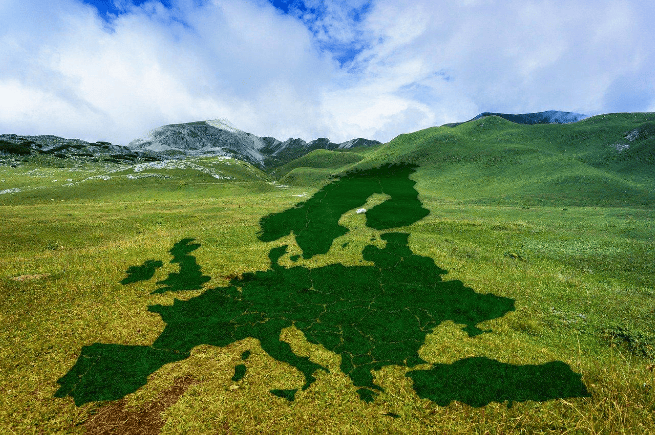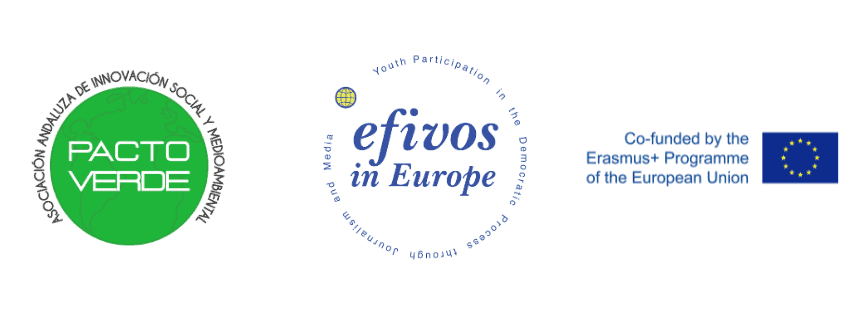Jorge Escabias Andreo
Graduado en Gestión Forestal. Amante de la naturaleza y los animales. Siempre abierto a explorar y vivir nuevas experiencias.
jorgeescabias@gmail.com
RESUMEN
Este artículo trata sobre el compromiso de La Unión Europea con un futuro sostenible a través del Pacto Verde Europeo, una estrategia integral para lograr la neutralidad climática en 2050. Este pacto no solo aborda el cambio climático, sino que también busca transformar la UE en una sociedad equitativa y próspera. Y también sobre como la participación activa de la juventud es fundamental, ya que serán ellos quienes enfrenten los impactos del cambio climático. La conciencia ambiental, las oportunidades de empleo y la participación ciudadana activa son aspectos clave para los jóvenes. La UE respalda su compromiso con programas como el Cuerpo Europeo de Solidaridad y Erasmus+, proporcionando oportunidades de financiamiento y fomentando la participación juvenil en proyectos sostenibles.
PALABRAS CLAVE: Green Deal, Sostenibilidad, Europa, Cambio Climático

INTRODUCCIÓN
En la Unión Europea la búsqueda de un futuro sostenible ha ido cobrando fuerza en los últimos años, esto se refleja en el compromiso de los Estados Miembros a través del Pacto Verde Europeo. Una estrategia que tiene como objetivo principal alcanzar la neutralidad climática en Europa para el año 2050. Así pues esta iniciativa no solo se centra en iniciativas políticas para combatir el cambio climático sino que también pretende transformar la Unión Europea en una sociedad equitativa y próspera, respaldada por una economía moderna y competitiva. Para poder conseguirlo se en su desarrollo se optó por un enfoque holístico e intersectorial, donde se abarcan diferentes áreas como el clima, el medio ambiente, la energía, el transporte, la industria, la agricultura y las finanzas sostenibles.
En el marco del Pacto Verde y la sostenibilidad futura del planeta la relevancia de los jóvenes es vital, esto se debe a que serán ellos los que enfrentarán directamente a los impactos a largo plazo del cambio climático. Por ello es necesario que crezca su conciencia ambiental y compromiso con la responsabilidad social y ambiental.
El Pacto Verde fue presentado oficialmente en diciembre del año 2019, y para poder lograr las metas establecidas se requerirá una gran movilización, con un alto porcentaje de recursos públicos. Para ello será imprescindible aumentar la financiación a proyectos sostenibles, mejorar la educación y formación ambiental e incrementar la investigación e innovación en materia de sostenibilidad y medio ambiente. Involucrando tanto a las instituciones europeas, los Estados Miembros y los ciudadanos en general. (Sociedad Pública Ihobe, 2020)
DESARROLLO
Para poder alcanzar todas las metas y objetivos en el Pacto Verde es necesario además de seguir el enfoque holístico que todos los ámbitos de actuación contribuyan a su consecución, y es por ello por lo que para que la actuación sea más eficiente el Pacto Verde está divido en diferentes estrategias e iniciativas entre las que destacan (Comisión Europea, 2023):
- Estrategia de la UE sobre la Biodiversidad de aquí a 2030
- Estrategia «De la Granja a la Mesa»
- Estrategia Industrial Europea
- Plan de Acción para la Economía Circular
- Pilas y baterías y sus residuos
- Transición justa
- Energía limpia, asequible y segura
- Estrategia de la UE para la sostenibilidad de las sustancias químicas
- Estrategia en favor de los Bosques y deforestación
Como ya hemos comentado serán los jóvenes europeos los que se enfrenten directamente a los efectos del cambio climático a largo plazo, por lo tanto es importante que estén al tanto del Pacto Verde y sus iniciativas para poder convertirse en ciudadanos activos que trabajen conjuntamente para su consecución. Otras de las razonas principales son:
Conciencia Ambiental: los jóvenes europeos deben ser cada vez más conscientes de los problemas ambientales y entender la urgencia de revertir el cambio climático.
Oportunidades de Empleo: la transición hacia una economía verde también va ligada a la creación de nuevos empleos en sectores relacionados con la sostenibilidad lo cual representará oportunidades de empleo para los jóvenes.
Participación Ciudadana: sin la participación activa de los jóvenes tanto en la política como en las iniciativas ambientales es imprescindible para garantizar el éxito del Pacto Verde.
Compromiso con la Responsabilidad Social y Ambiental: por suerte cada vez más jóvenes están comprometidos la responsabilidad social y ambiental pero se debe seguir trabajando para difundir las prácticas sostenibles.
En línea con esto además de la acción política, la UE ofrece diferentes oportunidades de financiación a los jóvenes y las organizaciones juveniles para fomentar su participación y compromiso con la sostenibilidad dentro de programas que aunque no se centran completamente en el cambio climático sí que ofrecen oportunidades relacionadas (Portal Europeo de la Juventud, 2021). Los más destacables son:
- Cuerpo Europeo de Solidaridad: voluntariados que permiten a los jóvenes (17 a 30 años) contribuir de forma práctica en diversos ámbitos, incluida la protección del medio ambiente y sostenibilidad.
- Intercambios de jóvenes en Erasmus+: Intercambios de entre 5 y 21 días para jóvenes (13 a 30 años) en los que trabajar en proyectos de forma conjunta, donde se incluye la sostenibilidad.
- Erasmus para jóvenes emprendedores: intercambios transfronterizos para jóvenes (nuevos empresarios y aspirantes) para aprender de empresarios experimentados donde la sostenibilidad en empresas cobra cada vez más relevancia.
CONCLUSIONES-DISCUSIÓN:
En el horizonte de la Unión Europea se vislumbra un compromiso sólido hacia un futuro sostenible, encarnado en el ambicioso Pacto Verde Europeo. En este viaje hacia la sostenibilidad, la participación activa de la juventud se revela como un componente vital. Serán los jóvenes quienes afrontarán directamente los impactos a largo plazo del cambio climático, por lo que su conciencia ambiental y compromiso con la responsabilidad social y ambiental son fundamentales.
REFERENCIAS BIBLIOGRÁFICAS
- Sociedad Pública Ihobe, 2020, El Pacto Verde Europeo, una hoja de ruta para impulsar la economía sostenible. https://www.ihobe.eus/actualidad/pacto-verde-europeo-una-hoja-ruta-para-impulsar-economia-sostenible
- Portal Europeo de la Juventud, 2021, Los jóvenes instan a la acción por el clima en toda Europa. https://youth.europa.eu/get-involved/sustainable-development/calling-climate-action-throughout-europe_es
- Comisión Europea, 2023, Pacto Verde Europeo https://www.consilium.europa.eu/es/policies/green-deal/
Jorge Escabias Andreo
Graduate in Forestry Management. Lover of nature and animals. Always open to explore and live new experiences.
jorgeescabias@gmail.com
TITLE The European Green Deal and its importance among the young population.
ABSTRACT
This article discusses the European Union’s commitment to a sustainable future through the European Green Deal, a comprehensive strategy to achieve climate neutrality by 2050. This pact not only addresses climate change but also seeks to transform the EU into an equitable and prosperous society. And also about how the active participation of youth is fundamental, as they will be the ones facing the impacts of climate change. Environmental awareness, employment opportunities and active citizenship are key issues for young people. The EU supports their commitment with programs such as the European Solidarity Corps and Erasmus+, providing funding opportunities and encouraging youth participation in sustainable projects.
KEY WORDS: Green Deal, Sustainability, Europe, Climate Change.

INTRODUCTION
In the European Union the search for a sustainable future has been gaining momentum in recent years, this is reflected in the commitment of the Member States through the European Green Pact. A strategy whose main objective is to achieve climate neutrality in Europe by 2050. Thus this initiative not only focuses on policy initiatives to combat climate change but also aims to transform the European Union into an equitable and prosperous society, supported by a modern and competitive economy. In order to achieve this, a holistic and cross-sectoral approach was chosen in its development, covering different areas such as climate, environment, energy, transport, industry, agriculture and sustainable finance.
Within the framework of the Green Pact and the future sustainability of the planet, the relevance of young people is vital, since they will be the ones who will directly face the long-term impacts of climate change. It is therefore necessary to increase their environmental awareness and commitment to social and environmental responsibility.
The Green Pact was officially presented in December 2019, and in order to achieve the established goals, a large mobilization will be required, with a high percentage of public resources. To this end, it will be essential to increase funding for sustainable projects, improve environmental education and training, and increase research and innovation in sustainability and the environment. Involving both European institutions, Member States and citizens in general. (Ihobe Public Company, 2020)
DEVELOPMENT
In order to achieve all the goals and objectives in the Green Pact it is necessary in addition to following the holistic approach that all areas of action contribute to its achievement, and that is why in order to make the action more efficient the Green Pact is divided into different strategies and initiatives among which stand out (European Commission, 2023):
- EU Biodiversity Strategy to 2030
- Farm to Table Strategy
- European Industrial Strategy
- Circular Economy Action Plan
- Batteries and their waste
- Just Transition
- Clean, Affordable and Secure Energy
- EU Strategy for the sustainability of Chemicals
- Strategy for Forests and deforestation
As we have already mentioned, it will be young Europeans who will be directly confronted with the effects of climate change in the long term, so it is important that they are aware of the Green Pact and its initiatives in order to become active citizens working together to achieve it. Other main reasons are:
Environmental Awareness: young Europeans must become increasingly aware of environmental issues and understand the urgency of reversing climate change.
Employment Opportunities: the transition to a green economy is also linked to the creation of new jobs in sectors related to sustainability which will represent employment opportunities for young people.
Citizen Participation: without the active participation of young people in both policy and environmental initiatives, it is imperative to ensure the success of the Green Pact.
Commitment to Social and Environmental Responsibility: fortunately more and more young people are committed to social and environmental responsibility but more work must be done to spread sustainable practices.
In line with this in addition to political action, the EU offers different funding opportunities to young people and youth organizations to encourage their participation and commitment to sustainability within programs that although not entirely focused on climate change do offer related opportunities (European Youth Portal, 2021). The most noteworthy are:
- European Solidarity Corps: volunteer programs that enable young people (17 to 30 years old) to make a practical contribution in various fields, including environmental protection and sustainability.
- Erasmus+ youth exchanges: Exchanges of 5 to 21 days for young people (13 to 30 years old) to work on projects together, including sustainability.
- Erasmus for young entrepreneurs: cross-border exchanges for young (new and aspiring) entrepreneurs to learn from experienced entrepreneurs where sustainability in business is becoming increasingly important.
CONCLUSIONS-DISCUSSION
A strong commitment towards a sustainable future, embodied in the ambitious European Green Pact, is on the horizon for the European Union. In this journey towards sustainability, the active participation of youth proves to be a vital component. It will be young people who will directly face the long-term impacts of climate change, so their environmental awareness and commitment to social and environmental responsibility are essential.
BIBLIOGRAPHICAL REFERENCES
- Ihobe Public Company, 2020, The European Green Pact, a roadmap to boost sustainable economy. https://www.ihobe.eus/actualidad/pacto-verde-europeo-una-hoja-ruta-para-impulsar-economia-sostenible
- European Youth Portal, 2021, Young people urge climate action across Europe. https://youth.europa.eu/get-involved/sustainable-development/calling-climate-action-throughout-europe_es
- European Commission, 2023, European Green Pact https://www.consilium.europa.eu/es/policies/green-deal/


